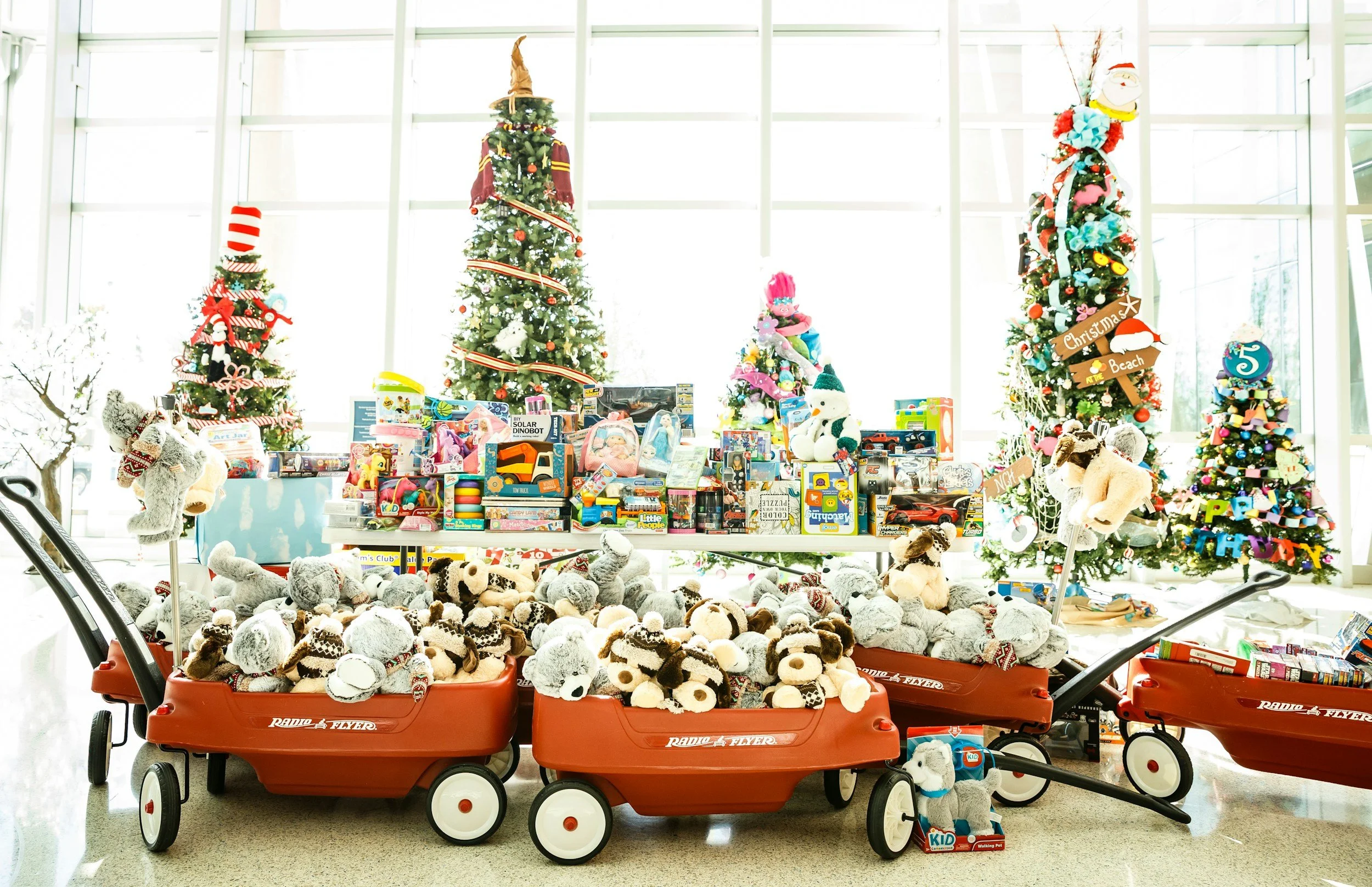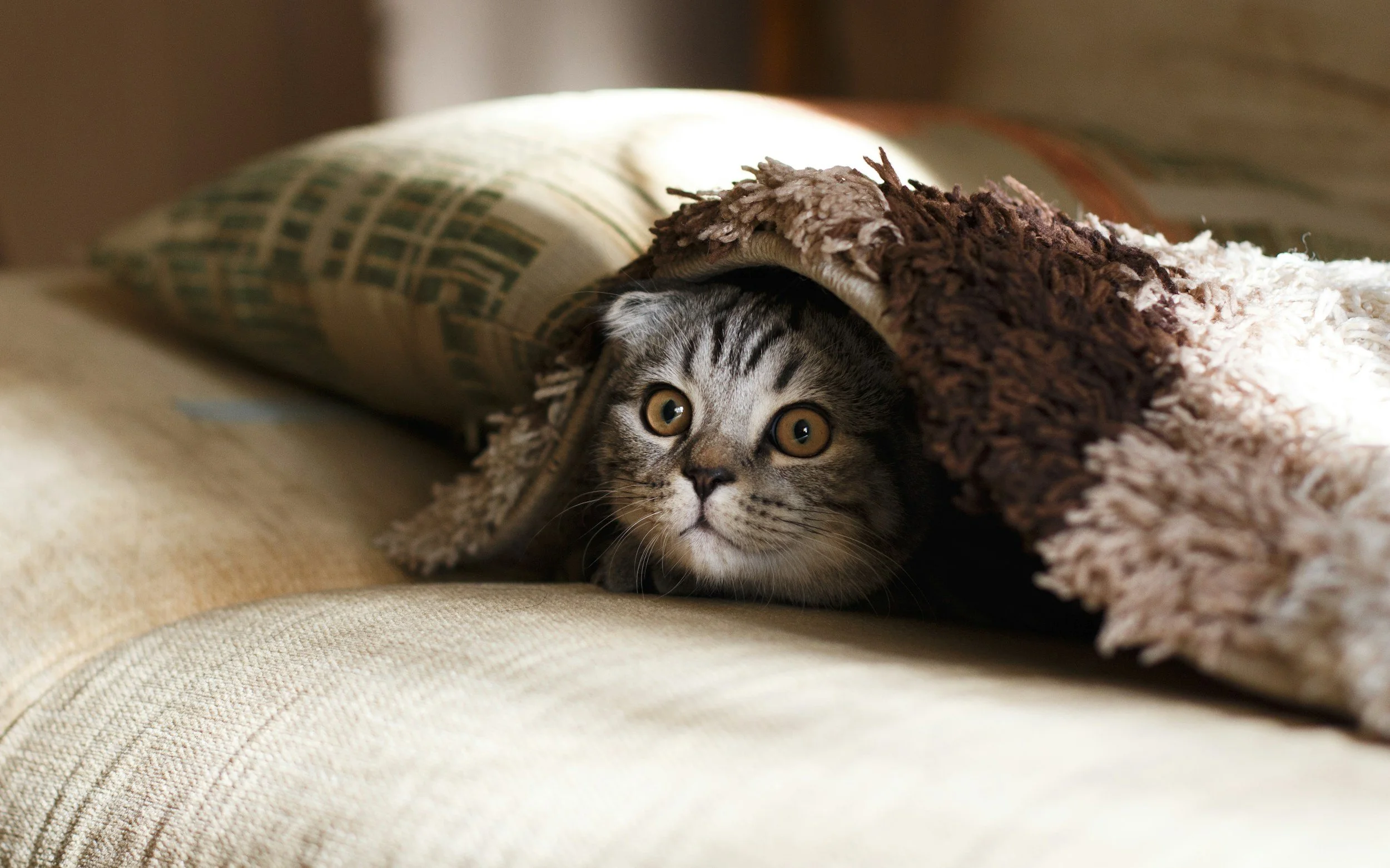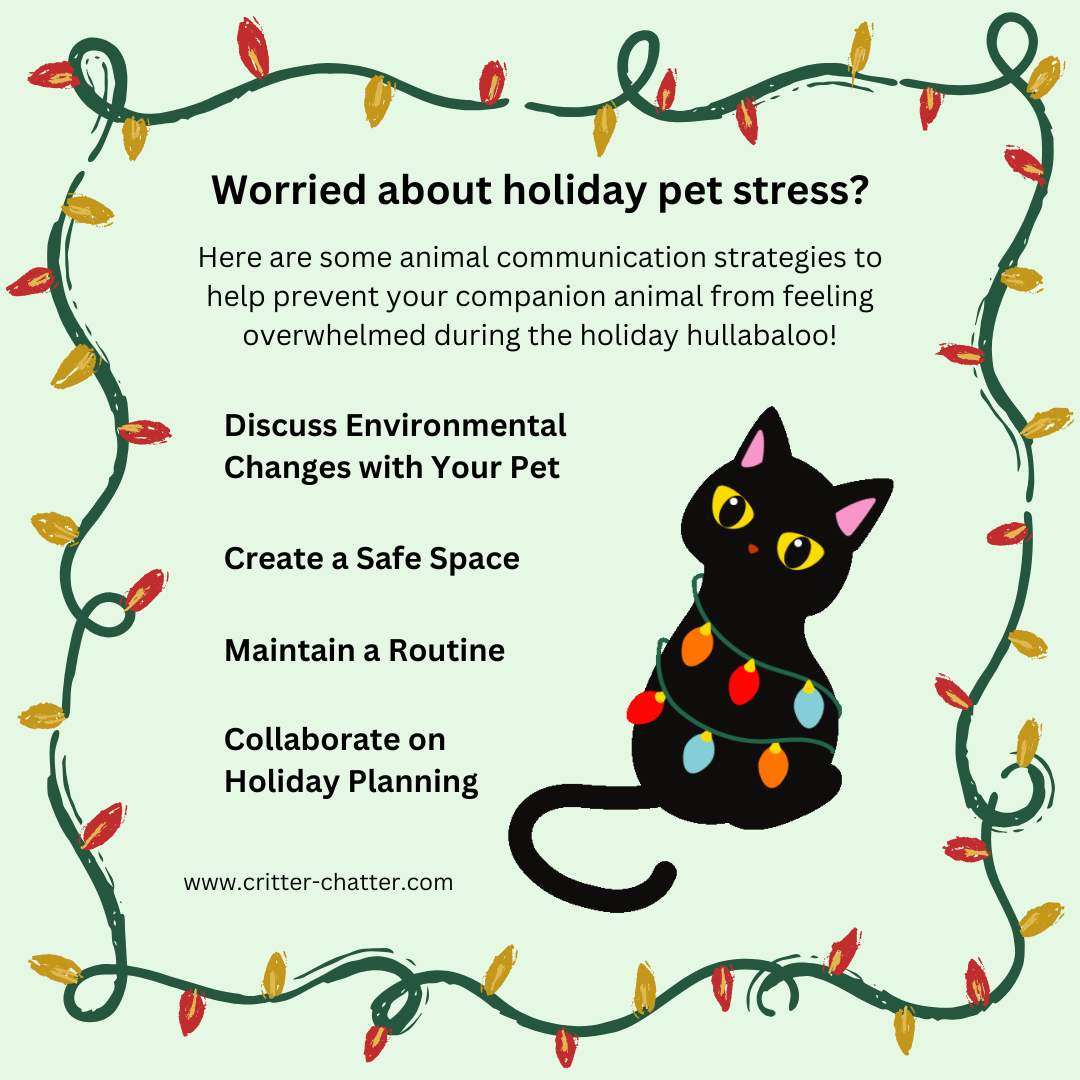How Animal Communication Can Help Your Pet Navigate Holiday Stress
The holiday season can be a magical time for many, filled with twinkling lights, the comforting aroma of baked goods, festive music, and holiday cheer. But for some companion animals, the excitement and energy of the holidays can become a bit more “bah, humbug!” than festive. Changes in routine, loud noises, unfamiliar faces, and new environments can all contribute to feelings of overwhelm. Since animals tend to be highly attuned to the energy around them, some pets might easily become overstimulated by the hustle and bustle of the season. Thankfully, animal communication offers a means to work with your companion to alleviate some of this stress. By telepathically checking in with your animal to better understand their needs, you can create a more peaceful environment and help them stay calm amid the chaos. Animal communication during the holidays benefits not only pets like dogs and cats but also their human guardians, fostering a sense of peace on earth and goodwill towards humans and their beloved animals.
What Causes Pet Stress During the Holiday Season?
The holidays (or “howl”idays?) bring about many changes, and some animals may be highly sensitive to shifts in their environment. From the flurry of holiday visitors to the jingle-jangle of decorations, the season’s festivities could be a lot for your furry friend to handle. While we may delight in the extra energy, some pets might experience holiday stress due to disruptions in their routine.
Common holiday stress triggers for companion animals include:
Loud holiday gatherings or parties
Shifts in their usual routine, like skipped walks or meals
Traveling to unfamiliar places (no matter how festive!)
New faces in the home, like visiting relatives
Decorations and unfamiliar objects taking over their space
It’s important to remember that no two animals are alike. One pet might become anxious with loud gatherings, while another welcomes the disruptions to their daily routine. Some animals may even enjoy the extra energy in the house, while others need a bit of time to “paws” and recharge.
The only way to truly know how your pet is being affected by holiday events is to ask them directly. By telepathically checking in with your companion, you can better understand their unique needs and create an environment that helps them stay calm, comfortable, and stress-free through the holidays.
How to Recognize Stress and Anxiety in Your Pet During the Holidays
Not all companion animals display stress in the same way, so it’s important to observe your fur baby closely for signs of anxiety during the holiday season. While certain behaviors may indicate that your animal is feeling overwhelmed, it’s essential to remember that these are just indicators—they provide a starting point for understanding how your pet is coping. Common signs of holiday stress in animals include:
Changes in eating or sleeping patterns
Hiding or avoiding people
Shaking, trembling, or pacing
Increased vocalization, such as barking or meowing
Restlessness or irritability
Each animal will exhibit stress differently, so it’s crucial to be attuned to their individual habits and behaviors. These signs can serve as red flags, indicating that a “silent night” is what they need most. If you notice any of these symptoms, you can use animal communication to open a dialogue and ask your pet what’s troubling them.
Ultimately, the only way to truly understand how your companion is being affected by holiday activities is to ask them directly through telepathy. By combining your observation skills with telepathic communication, you gain valuable insights into your animal’s feelings about holiday events. This collaborative approach allows you to problem-solve together, addressing whatever may be causing your pet stress. Checking in and encouraging your companion to share their emotions opens the door to deeper communication, providing you with the clarity needed to ease their anxiety and ensure their holiday experience is as joyful and stress-free as possible.
The Connection Between Pet Stress and Your Own
Sometimes, the stress your animal exhibits may not stem from their environment or holiday changes but could be a reflection of your own stress. As you work to create a serene atmosphere for your companion, it's crucial to also consider your own emotional well-being. The holiday season can be stressful for both pets and their humans, and addressing your own stress might be just as important as addressing your animal’s.
Pets typically are highly attuned to their human companions, and they often pick up on our emotional states. If you’re feeling stressed or overwhelmed, your animal may respond to this emotional energy, which can manifest as stress in them as well. Understanding this connection can help you address both your own stress and that of your pet more effectively.
To help both yourself and your animal manage stress effectively, start by identifying the source of the stress:
Evaluate Your Own Stress: Take moments to reflect on your own emotional and mental well-being. Are you feeling overwhelmed by holiday preparations, family gatherings, or other stressors? Your stress can directly impact your pet’s behavior and overall sense of security.
Communicate with Your Pet: Engage in telepathic communication with your animal to understand their feelings and stressors. Ask if their anxiety is related to specific changes in their environment or if it’s reflecting something they’re picking up from you.
Once you distinguish whether the stress originates from your pet’s or your own emotional state, you can address each source more effectively. For instance, if you discover that your animal’s stress is linked to your own anxiety, taking steps to manage your stress can positively impact your pet. Prioritizing your mental and emotional health will not only benefit you but also ensure that your companion enjoys a more peaceful and joyful holiday season.
Using Animal Communication to Help Your Pet Stay Calm During the Holidays
Animal communication provides an effective way to ensure that your pet feels more comfortable during this busy time. By regularly checking in telepathically, you can work with your animal to gauge their stress levels and make timely adjustments to their environment, helping them stay calm and grounded amidst the holiday excitement.
For instance, if you notice your cat hiding under the bed, you might ask, “I see you're hiding under the bed. Are you feeling stressed about having visitors in the house?” Then, wait for their telepathic response. You might hear answers like “yes,” “no,” “sometimes,” or “not really,” which will provide valuable insights to guide the conversation further. Using closed-ended questions (questions that are answered with one word, such as “yes” or “no”) is a great place to start because it helps keep the conversation basic.
Here’s an example of how a conversation like this might unfold:
Human: I see you're hiding under the bed. Are you feeling stressed about having visitors in the house?
Cat: Yes.
Human: What is it about having visitors that stresses you out? Is it the kids running around?
Cat: No.
Human: Is the noise level bothering you?
Cat: Yes.
Human: Would it help if I turned the music down?
Cat: Yes.
Your cat’s responses offer clarity on her feelings, allowing you to make adjustments that can reduce her stress.
Strategies to Help Prevent Pet Stress During the Holidays
Recognizing early signs of pet stress, such as changes in behavior, can signal that it’s time to check in with your furry friend. But there are also proactive measures that can be combined with animal communication to help prevent your animal from feeling stressed in the first place.
Here are some topics to discuss with your companion to keep their holiday season merry and bright:
Collaborate on Holiday Planning: Explain upcoming events, such as festive gatherings or travel plans, and invite your animal to share their thoughts. Ask them which holiday activities they’d like to join and when they need some space. Including them in the planning process can help reduce their anxiety by acknowledging their role as a cherished part of the family festivities. Plus, your animal’s insights might surprise you and help you plan more effectively!
Maintain a Routine: Many companion animals thrive on the stability that routines provide, which helps them manage their energy and also supports you in managing yours. Holiday disruptions can stress both you and your pet. Telepathically ask your animal which parts of their routine are most comforting. Whether it’s mealtimes, walks, or a regular bedtime, explaining any necessary changes and working together to maintain as much normalcy as possible can help both you and your animal feel secure amid the holiday hustle and bustle.
Create a Safe Space: Collaborate with your pet to identify a safe zone in the house. Use animal communication to find out where they feel most comfortable and what they’d like in their holiday retreat. Ask them which of their favorite items, like a beloved blanket or toy, they’d prefer in their cozy corner. Providing them with a designated escape from the festive chaos will give them a sense of security when things get overwhelming. A comfy bed, familiar toys, or a quiet nook will help them navigate the holiday season with ease.
Discuss Environmental Changes with Your Pet: The Christmas tree might bring new scents into your home, or holiday decorations could disrupt your companion’s sense of normalcy. While some animals might find these changes exciting, others might need some extra reassurance. It’s always a good idea to check in with them telepathically to ensure they’re comfortable with their surroundings. By consulting with your pet about holiday decor and other seasonal changes, you can help them adapt and avoid any unnecessary stress.
By proactively discussing these festive adjustments with your animal, you’re not only spreading holiday cheer but also ensuring a smoother, more peaceful season for both you and your furry friend.
Questions You Can Ask Your Pet About the Holidays
Communicating with your animal during the holiday season can help them feel included and reduce their stress. Here are some examples of questions you can ask, using both closed- and open-ended formats to better understand your companion’s feelings and preferences.
Closed-Ended Questions:
These are yes/no or simple-answer questions that can help you gauge your pet’s feelings and preferences more directly.
"Would you like to stay in the living room when guests arrive?"
"Do you feel comfortable with the holiday decorations?"
"Would you prefer to have your bed in a quieter room when there’s company?"
"Do you enjoy the extra activity around the house?”
“Would you like more quiet time?"
Open-Ended Questions:
These questions allow your pet to provide more detailed feedback, giving you a deeper insight into their thoughts and emotions.
"How do you feel about the upcoming holiday events?"
"What can I do to help you feel more comfortable during the holidays?"
"Which activities do you enjoy being part of, and when do you need some space?"
"Where do you feel most comfortable when things get busy?"
"How can I support you better when we have guests or travel plans?"
Asking these types of questions opens a dialogue with your animal and helps you better understand their needs. By listening to their responses, you can work with your pet to create a holiday environment that feels safe and secure.
Collaborating with your Pet to Create a Season of Merry and Bright
Navigating the holiday season in collaboration with your companion can transform a potentially stressful time into one of joy and comfort for both of you, helping you create lasting memories and strengthen your relationship. By being attentive to your animal’s needs and addressing your own emotional well-being, you create a harmonious environment that fosters happiness and reduces stress. Animal communication enables you and your pet to work closely together to ensure they feel safe and secure in the midst of the holiday hustle and bustle.
As you prepare for holiday celebrations, remember that a little proactive communication and empathy can go a long way. By actively engaging with your pet and working together to make thoughtful adjustments to their environment, you not only support them with enhancing their experience but also nurture your relationship with one another.
This season, let the spirit of understanding and compassion guide your interactions with your animal. In doing so, you’ll create a more peaceful, joyful holiday experience for all—whether they walk, fly, slither, or crawl. Here’s to a holiday season filled with warmth, connection, and contentment for you and your cherished companion!
Key Takeaways
Holiday Stress for Pets: The holiday season can bring significant changes to a pet’s routine, including loud noises, new faces, and unfamiliar environments, which can cause stress and anxiety.
Individual Reactions: Each pet responds differently to holiday stress. Some may become anxious or withdraw, while others might thrive on the added energy. Observing and understanding your pet’s unique responses is crucial.
Signs of Stress: Common signs of stress in pets include changes in eating or sleeping patterns, hiding, trembling, increased vocalization, and irritability. These behaviors can signal that your pet is feeling overwhelmed.
The Connection Between Pet and Human Stress: Many pets are sensitive to their human companions’ emotions. If you’re feeling stressed like a turkey in the oven, your pet may mirror that anxiety. Managing your own stress can help reduce your pet’s stress levels.
Using Animal Communication: Telepathic communication with your pet can provide insights into their feelings and preferences. This helps in creating a more comfortable environment, addressing specific stressors, and ensuring a pawsitive holiday experience.
Proactive Strategies: Engage in proactive communication with your pet about holiday plans. Maintain routines, create safe havens, and discuss environmental changes to help your pet adapt to the festive season.










